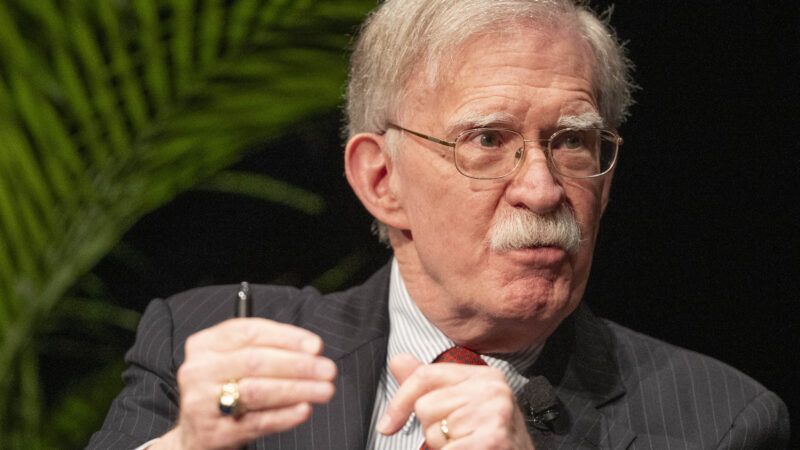Donald Trump Turns on His First Term's Middle East Hawks
But that doesn't mean he's embracing the doves.

Conservative talk show host Tucker Carlson described former national security adviser John Bolton as a "bureaucratic tapeworm." Bolton, a notorious war hawk, spent much of the first Trump administration trying to prevent diplomacy with North Korea and Iran exactly when Trump was interested in negotiating with those countries. During a June 2019 standoff with Iran that nearly led to war, Carlson complained that Bolton "seems to live forever in the bowels of the federal agencies, periodically reemerging to cause pain and suffering."
But Bolton won't be reemerging from any bowels now, at least not for the next four years. On his first day back in office, President Donald Trump signed an executive order singling out Bolton for condemnation. Because Bolton's decision to publish a tell-all memoir in 2020 "created a grave risk" to national security "for monetary gain," the order says, the administration is revoking "any active or current security clearances" held by Bolton.
The next day, Trump publicly fired Brian Hook, who had been running the State Department transition team, because Hook was "not aligned with our vision to Make America Great Again." During the first Trump administration, Hook helped purge the State Department of officials who were perceived as soft on Syria or insufficiently "friendly to Israel," ran an obsessive campaign to overthrow the Iranian government, and got in the way of U.S.-Iranian hostage negotiations.
The first Trump administration took a highly aggressive line on the Middle East—hiring Bolton and Hook was part of that policy—but his second administration may turn things around. Even before taking office this week, Trump helped broker an Israeli-Palestinian ceasefire and hostage exchange. Although Trump's son-in-law, Jared Kushner, had earlier called for a joint U.S.-Israeli military campaign to reshape the region, the Trump administration reportedly refused to commit to bombing Iran and warned Israeli Prime Minister Benjamin Netanyahu not to "fuck this [ceasefire] up."
"We will measure our success not only by the battles we win but also by the wars that we end. And, perhaps most importantly, the wars we never get into. My proudest legacy will be that of a peacemaker and unifier," Trump said during his inaugural address on Monday. "I'm pleased to say that, as of yesterday, one day before I assumed office, the hostages in the Middle East are coming back home to their families."
Trump is not a principled dove, especially when it comes to the United States' immediate neighbors. He wants to escalate the war on drugs in Mexico into a counterterrorism campaign and has threatened even U.S. treaty allies such as Canada, Denmark, and Panama over territory. Most ominously, his new national security adviser, Mike Waltz, is every bit the hawk Bolton was.
Joel Rayburn, another hawk from the first Trump administration who has been working closely with Hook, is expected to run the State Department's Middle Eastern bureau, reports the Saudi news outlet Al Arabiya. And Trump appointed yet another first administration veteran, Morgan Ortagus, to be deputy special presidential envoy for Middle East peace, along with a cryptic statement: "Early on Morgan fought me for three years, but hopefully has learned her lesson. These things usually don't work out, but she has strong Republican support, and I'm not doing this for me, I'm doing it for them."
A big question mark looms over Trump's relationship with Iran. At his first post-inaugural rally on Monday night, Trump said that Iran was "weakened" and blamed the Iranian government for the October 2023 attacks on Israel. (Leaked documents show that Iran had given vague commitments to help Hamas in a future war with Israel, but the Iranian government seemed blindsided by the timing of the attack.) During the rally, Trump returned to an old theme: that the economic sanctions campaign of Trump's first term left Iran "broke."
The key issue is over Iran's nuclear program. Although Iran hasn't decided to build a nuclear bomb, as far as the U.S. government knows, it has accumulated the materials it needs to build one quickly. And Iranian officials have hinted that the conflict with Israel or additional U.S. pressure might force them to make that decision. Trump, like every U.S. president since George W. Bush, has threatened to attack Iran if it does go for a bomb.
"I am not looking to be enemies with Iran. I would love to get along with them, but they cannot have a nuclear weapon. You just cannot let them have a nuclear weapon," Trump told Fox News in September last year. "If they do have a nuclear weapon, Israel is gone. It will be gone."
Vice President J.D. Vance has also said that "our interest very much is in not going to war with Iran."
Iranian President Masoud Pezeshkian told NBC last week that he "is ready to engage with a second Trump administration," though he "doubts that, even if we engage in negotiations, they are actually seeking to overthrow the Iranian government instead of resolving the issues."
The last time Trump had a chance to meet directly with the Iranian government, Bolton pushed back hard. Mark Dubowitz, head of the neoconservative Foundation for Defense of Democracies and a highly influential figure during Trump's first term, is hoping that the new generation of "hawks in the administration could try to block a deal internally by framing it as 'humiliating' or 'embarrassing' to Trump personally," reports the Jewish Insider.
"If the [Vance and Carlson] view trumps the views of people like [Secretary of State Marco] Rubio and Waltz and [Secretary of Defense nominee Pete] Hegseth and others, then you could see there being a deal," Dubowitz told the Insider. "The deal should be avoided at all costs because all it's going to do is put Israel in a much weaker position," he warned.


Show Comments (31)